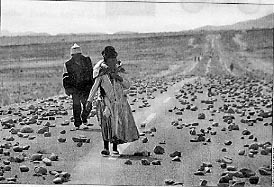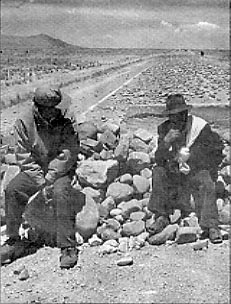October 7, 2000



Peasants, teachers end protests, but coca growers maintain road
October 7, 2000 Web posted at: 4:26 PM EDT (2026 GMT)LA PAZ, Bolivia (AP) -- Peasants and schoolteachers agreed to end protests, but coca growers refused to lift a blockade of Bolivia's main highway after three weeks of protests that have left 10 people dead and caused millions of dollars in losses to South America's poorest nation.
The government agreed to most of the demands by the teachers and peasants, allowing a deal early Saturday to end the protests in talks mediated by the Roman Catholic Church.
Even as that agreement was reached, however, talks broke off between the government and farmers growing coca -- used to make cocaine -- in the tropical region of Chapare, 580 kilometers (360 miles) southeast of La Paz.
The government refused the coca farmers' demand to suspend the forceful eradication of their plantations, a key element in the government's fight against cocaine production and trafficking.
Angry leaders of the farmers returned to Chapare promising to maintain the road block they set up three weeks ago on the country's main highway, linking central Bolivia with the farming zones between the cities of Santa Cruz and Cochabamba.
The government repeatedly sent soldiers and police to clear the road, but the farmers, often chanting "coca or death," blocked them again. The blockades left hundreds of vehicles stranded and caused food shortages in many cities, including La Paz.
Clashes over the farmers' blockades and others by peasants have left 10 people dead and 120 wounded since the protests started.
President Hugo Banzer has accused cocaine traffickers of organizing the unrest to destabilize the country. "For us to stop the eradication of coca is to turn over the nation to cocaine traffickers," Banzer said last week. "We will not surrender in our fight against cocaine trafficking."
The government has already eradicated most of the coca plantations in Chapare. Less than 2,000 hectares (5,000 acres) remain, and growers leader Evo Morales is demanding each family be allowed to plant about 1,600 square meters (17,000 square feet) of coca. This would amount to 12,000 hectares (30,000 acres) of new coca.
Meanwhile, school teachers prepared to return to classes on Monday, and peasants agreed to immediately lift roadblocks they erected in many areas. Peasant leader Felipe Quispe warned his sector will remain on alert to make sure the government keeps its promises.
Opposition leader Carlos Sanchez criticized the government, saying it had given in to the strikers' demands. "The government has been brought to its knees," he said.
The government agreed to guarantee ample use of public irrigation systems and expanded access to farming land, as well as to compensate the families of the victims of the protests.
As part of their agreement, the schoolteachers were promised new bonuses totaling 1,500 bolivianos ($230) each.
The unrest has caused losses valued at about $130 million, or 1.5 percent of Bolivia's GNP, according to the government.
Copyright 2000 The Associated Press. All rights reserved. This material may not be published, broadcast, rewritten, or redistributed.